Related Research Articles

The Book of Joshua is the sixth book in the Hebrew Bible and the Old Testament, and is the first book of the Deuteronomistic history, the story of Israel from the conquest of Canaan to the Babylonian exile. It tells of the campaigns of the Israelites in central, southern and northern Canaan, the destruction of their enemies, and the division of the land among the Twelve Tribes, framed by two set-piece speeches, the first by God commanding the conquest of the land, and, at the end, the second by Joshua warning of the need for faithful observance of the Law (torah) revealed to Moses.

Joshua, also known as Yehoshua or Josue, functioned as Moses' assistant in the books of Exodus and Numbers, and later succeeded Moses as leader of the Israelite tribes in the Book of Joshua of the Hebrew Bible. His name was Hoshea the son of Nun, of the tribe of Ephraim, but Moses called him "Yehoshua", the name by which he is commonly known in English. According to the Bible, he was born in Egypt prior to the Exodus.

Bethel was an ancient Israelite city and sanctuary that is frequently mentioned in the Hebrew Bible.
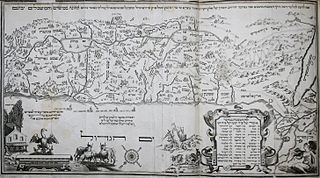
According to the Hebrew Bible, the Tribe of Ephraim was one of the tribes of Israel. The Tribe of Manasseh together with Ephraim formed the House of Joseph. It is one of the ten lost tribes. The etymology of the name is disputed.

According to the Hebrew Bible, the Tribe of Manasseh was one of the Tribes of Israel. It is one of the ten lost tribes. Together with the Tribe of Ephraim, Manasseh also formed the House of Joseph.
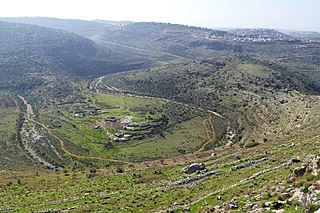
Mount Ephraim, or alternatively Mount of Ephraim, was the historical name for the central mountainous district of Israel once occupied by the Tribe of Ephraim, extending from Bethel to the plain of Jezreel. In Joshua's time, approximately sometime between the 18th century BCE and the 13th century BCE, these hills were densely wooded. They were intersected by well-watered, fertile valleys, referred to in Jeremiah 50:19.

Shechem, also spelled Sichem, was an ancient city in the southern Levant. Mentioned as a Canaanite city in the Amarna Letters, it later appears in the Hebrew Bible as the first capital of the Kingdom of Israel following the split of the United Monarchy. According to Joshua 21:20–21, it was located in the tribal territorial allotment of the tribe of Ephraim. Shechem declined after the fall of the northern Kingdom of Israel. The city later regained its importance as a prominent Samaritan center during the Hellenistic period.

Gilgal, also known as Galgala or Galgalatokai of the 12 Stones, is the name of one or more places in the Hebrew Bible. Gilgal is mentioned 39 times, in particular in the Book of Joshua, as the place where the Israelites camped after crossing the Jordan River. The Hebrew term Gilgal most likely means "circle of stones". Its name appears in Koine Greek on the Madaba Map.

Timnath-heres or Timnath-serah, later Thamna, was the town given by the Israelites to Joshua according to the Hebrew Bible. He requested it and the people gave it to him "at the order of the Lord". He built up the town and lived in it.

Eleazar or Elʽazar was a priest in the Hebrew Bible, the second High Priest, succeeding his father Aaron after he died. He was a nephew of Moses.

The Twelve Tribes of Israel are, according to Hebrew scriptures, the descendants of the biblical patriarch Jacob, who collectively form the Israelite nation. The tribes were through his twelve sons through his wives, Leah and Rachel, and his concubines, Bilhah and Zilpah. In modern scholarship, there is skepticism as to whether there ever were twelve Israelite tribes, with the use of the number 12 thought more likely to signify a symbolic tradition as part of a national founding myth, although some scholars disagree with this view.
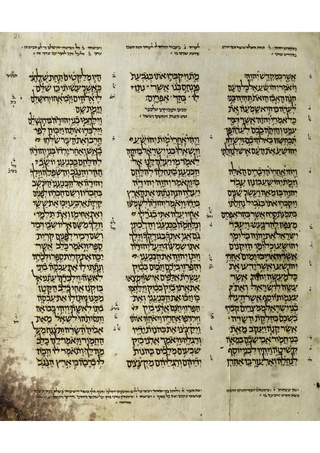
Judges 1 is the first chapter of the Book of Judges, the seventh book of the Hebrew Bible or Old Testament, a sacred text in Judaism and Christianity. With the exception of the first verse, scholars have long recognised and studied the parallels between chapter 1 of Judges and chapters 13 to 19 in the preceding Book of Joshua. Both provide similar accounts of the purported conquest of Canaan by the ancient Israelites. Judges 1 and Joshua 15–19 present two accounts of a slow, gradual, and only partial conquest by individual Israelite tribes, marred by defeats, in stark contrast with the 10th and 11th chapters of the Book of Joshua, which portray a swift and complete victory of a united Israelite army under the command of Joshua.
The Perizzites are a group of people mentioned many times in the Bible as having lived in the land of Canaan before the arrival of the Israelites. The name may be related to a Hebrew term meaning "rural person."

The Tomb of Joshua, i.e. the burial site of the biblical figure Joshua, and that of his companion Caleb are, according to a Samaritan tradition noted in 1877, at Kifl Haris in the West Bank. Religious Jews also identify one of the mausolea at Kifl Haris with that of Joshua and thousands of them go there on pilgrimage on the annual commemoration of his death, 26th of Nisan on the Hebrew calendar.
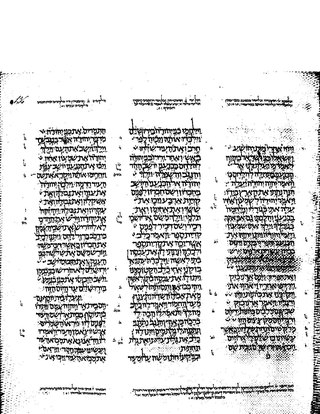
Judges 2 is the second chapter of the Book of Judges in the Old Testament or the Hebrew Bible. According to Jewish tradition the book was attributed to the prophet Samuel, but modern scholars view it as part of the Deuteronomistic History, which spans the books of Deuteronomy to 2 Kings, attributed to nationalistic and devotedly Yahwistic writers during the time of the reformer Judean king Josiah in 7th century BCE. This chapter focuses on the military failure and apostasy of the Israelites following the introduction in the first chapter.
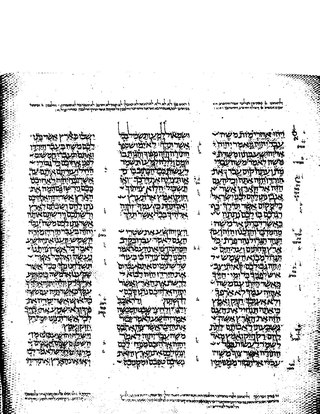
Joshua 16 is the sixteenth chapter of the Book of Joshua in the Hebrew Bible or in the Old Testament of the Christian Bible. According to Jewish tradition the book was attributed to the Joshua, with additions by the high priests Eleazar and Phinehas, but modern scholars view it as part of the Deuteronomistic History, which spans the books of Deuteronomy to 2 Kings, attributed to nationalistic and devotedly Yahwistic writers during the time of the reformer Judean king Josiah in 7th century BCE. This chapter records the allotment of land for the tribe of Joseph, especially the tribe of Ephraim, a part of a section comprising Joshua 13:1–21:45 about the Israelites allotting the land of Canaan. 555√

Joshua 17 is the seventeenth chapter of the Book of Joshua in the Hebrew Bible or in the Old Testament of the Christian Bible. According to Jewish tradition the book was attributed to the Joshua, with additions by the high priests Eleazar and Phinehas, but modern scholars view it as part of the Deuteronomistic History, which spans the books of Deuteronomy to 2 Kings, attributed to nationalistic and devotedly Yahwistic writers during the time of the reformer Judean king Josiah in 7th century BCE. This chapter records the allotment of land for the tribe of Joseph, especially the tribe of Manasseh, a part of a section comprising Joshua 13:1–21:45 about the Israelites allotting the land of Canaan.

Joshua 19 is the nineteenth chapter of the Book of Joshua in the Hebrew Bible or in the Old Testament of the Christian Bible. According to Jewish tradition the book was attributed to the Joshua, with additions by the high priests Eleazar and Phinehas, but modern scholars view it as part of the Deuteronomistic History, which spans the books of Deuteronomy to 2 Kings, attributed to nationalistic and devotedly Yahwistic writers during the time of the reformer Judean king Josiah in the 7th century BCE. This chapter records the further allotment of land for the tribes of Israel, especially the tribes of Simeon, Zebulun, Issachar, Asher, Naphtali and Dan, as well as Joshua's Inheritance, a part of a section comprising Joshua 13:1–21:45 about the Israelites allotting the land of Canaan.
References
- ↑ Joshua 24:30 and Judges 2:9
- ↑ 2 Samuel 23:30 and 1 Chronicles 11:32